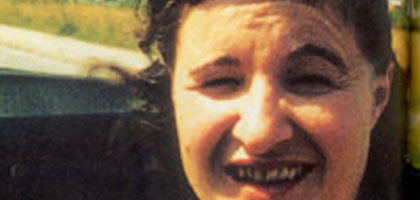
Cruel intentions
Film of the Month: Dog Days

The darkly comic Dog Days uncovers the seedy underside of suburban life in Vienna - and plays like arthouse Big Brother. By Richard Falcon
In Hanif Kureishi's short story 'Strangers When We Meet', a producer expresses confidence in his film's future success at international festivals "where they are so moneyed and privileged, they adore anything seedy and cruel." He could have been talking about Dog Days (Hundstage), controversial documentarist Ulrich Seidl's first fiction feature, which won the Grand Jury Prize at Venice and was honoured in his native Austria. Impassively and meticulously (it took three and a half years to cast, shoot and post-produce), the film presents us with increasingly cruel and seedy behaviour, leaving its audience to interpret its meanings.
Alternating between a southern suburb of Vienna made up of estates of modernist whitewashed villas, seemingly endless out-of-town retail parks with large, open carparks and sliproads to the Autobahn, Dog Days is a milieu movie par excellence, often brilliantly substituting the blank architectural details of its setting for narrative context. Using visually striking but unemotive amateur actors alongside accomplished theatrical talent, and taking place over a sweltering weekend in the dog days of late July/early August, the film interweaves the experiences of six groups of characters: teenage clubber Klaudia (Franziska Weiss) and her jealous boy-racer boyfriend Mario (Rene Wanko); thirtysomething Theodorakis and his ex-wife, still uneasily sharing a house after the death of their young daughter; pensioner Mr Walter, who lives alone with his dog but has designs on his elderly housekeeper; a middle-aged teacher who is waiting for her boyfriend to spend the evening with her but finds herself abused when he arrives; a thirtyish, mentally challenged woman Anna who passes her time hitching lifts from strangers in a supermarket carpark; and Hruby, a middle-aged security-system salesman.
A montage during the main titles, of semi-naked residents of all shapes and sizes lying in the sun, sets the tone. Fastidiously composed wide-angle images, with the fleshy corporeality of the characters (who are oblivious to the camera's gaze) arranged against the rectilinear landscape of patios, pools and rows of houses, offer a fine-art revision of the opening Queens montage in Sidney Lumet's Dog Day Afternoon (1975). The Kubrick-like formality and evocation of such Diane Arbus photographs as 'A family on their lawn one Sunday in Westchester, N.Y.' (1968) suggest that stasis, torpor, surveillance, isolation and exposure will be the film's dominant motifs.
The cold reticence of the compositions juxtaposed with the sweltering heat the characters experience establishes Seidl's primary aesthetic strategy: the minimisation of audience empathy with his characters, empathy usually rooted in the recognition of a shared system of values between audience and film-maker. Instead we watch characters interact with varying degrees of grotesqueness and emotional and occasionally physical brutality. We are required initially to take it on trust that what's at stake is of wider significance than just another contribution to a European cinema - from Dogme to Dumont, Noé to Haneke - increasingly lodged in an increasingly ineffective, transgressive mode. (In interview Seidl has denied his desire to provoke, observing that there are few social conventions left for movies to flout.) Dog Days, though, ultimately repays our faith with a high level of cinematic intensity, an unexpectedly sardonic tone and faint glimmers of something which could be dimly recognised as hope and compassion.
The film opens in a public toilet where violently jealous teenager Mario, a Viennese equivalent of an Essex man with his branded sports gear and body-kit Mondeo, is beating up a young man for staring at his dancer girlfriend Klaudia. He attacks another youth for the same reason, then persecutes the silent Klaudia with his reckless driving and manic ranting. Non-communication, aggression and vindictiveness seem the norm, cars the affectless passion of the suburban soul-dead. Mr Walter carefully tends the flowers in his garden; when he gets no response to his remonstrations with the neighbours bickering behind the fence, he starts up his noisy lawnmower and leaves it running, pulling down the roller shutter on his door.
Theodorakis similarly pulls down a roller shutter on his estranged wife as she lies sunbathing. The couple move around their home - all hard, tiled surfaces and comfortless hallways - ignoring each other. Seidl undermines with nasty thoroughness the suburban values of privacy and security that lurk behind these shutters. The obese, sweating salesman Hruby, the nearest the film has to a bridging character, walks from house to house, hopelessly pitching his security systems, pointing out to Mr Walter, who already has a CCTV monitor on his desk, that his elderly dog, far from being a deterrent, will itself need protecting. (In the context of extreme arthouse cinema, we know he's right.) Theodorakis lets Hruby inside, and he marches around the rooms, his professional bustle failing to mask his intrusiveness. ("Is everyone in your profession so nosy?" Theodorakis asks him.)
It's Seidl's camera, though, that feels like the real interloper. It noses in on characters in moments of isolation, their dwellings like Big Brother houses in which the inhabitants - not young exhibitionists but damaged figures at various stages in a life cycle indelibly imprinted on their ruthlessly exposed flesh - are minutely observed. Christine Jirku as the middle-aged teacher, for instance, is shown in her underwear, wiping grease from a chicken leg from her chest, trimming her pubic hair, her haggard but compelling face an image of lifelessness - like someone filmed unawares rather than an actor performing being alone. For stretches each of the characters is shot in this way, heightening the cruelty of their later interactions.
Seidl's controversial documentaries about coke-addicted models, Austrian men buying Thai brides or people's relationships with their pets (which guyed audiences' expectations of onscreen bestiality) pre-empted the current reality-TV explosion, with its disregard for public-private boundaries. Dog Days' quest for authenticity in a thoroughly commodified world, which raises voyeurism to possibly profound, certainly profoundly unsettling levels, finds its sacrificial lamb in Anna, the mentally challenged hitchhiker. Played with excruciating verisimilitude by professional actor Maria Hofstätter, Anna obliterates notions of civility by asking the drivers she accosts unabashedly intrusive questions about their sex lives, health and appearance while going through their personal effects, demanding they play a mawkish tape she has with her and reciting ten-best lists (sexiest Austrian television presenters, sexual positions, supermarkets). Comedy and tragedy are inseparable up to the point when Hruby offers her to his clients for physical abuse as a scapegoat, having been charged with finding the vandal who has been scratching their cars. Anna is accorded the film's final shot, where she dances in the dark, causing the security lights to blink on and off. In an image reminiscent of Bruno Dumont's La Vie de Jésus, Seidl shows her walking home after her mistreatment across a road empty except for a woman mechanically reciting Hail Marys as the heavens open.
The downpour seems to usher in the possibility of redemption for Mr Walter, who dresses his willing housekeeper in his dead wife's clothes to do a striptease for him, and for the grieving couple, who sit together silently on swings in the rain. The scenes featuring Theodorakis simmering alone, frustratedly slamming a tennis ball against the side of his drained swimming pool in another image of stark beauty, while his ex-wife seduces a masseur, had seemed to present their grief as a part explanation for the film's ubiquitous non-communication. But in both cases Seidl prefers our moral queasiness to our empathy - the wife is introduced with a hardcore establishing shot of her having troilistic sex during an orgy in a sex club, while we watch Mr Walter's elderly housekeeper's striptease in full from his static POV.
But the film's most difficult scenes involve the extended humiliation suffered by the teacher at the hands of her slobbish lover Wickerl (played with apparent drunken abandon by real-life Austrian sex-club owning pornographer Victor Hennemann) and his manic buddy Lucky, as a prelude to a boozy debauch during which they sexually abuse her and make her sing 'La Cucaracha'. Black humour, misogyny and astonishing, seemingly improvisational acting combine to make the scene both wholly opaque and uncomfortably immediate. Lucky returns the next day to hold Wickerl at gunpoint and humiliate him in return, less, it seems, on the teacher's behalf than because he's developed a taste for mistreating others.
Seidl's next project, after the everyday fascism observed in Dog Days, is a segment of Zur Lage (The Situation), a portmanteau documentary about Austria under its right-wing government. Any director who devises a scene in which a pornographer with a lit candle up his arse is forced at gunpoint to sing the Austrian national anthem ("A nation blessed by its sense of beauty, Highly praised Austria") clearly has views on the subject that deserve to be heard.
